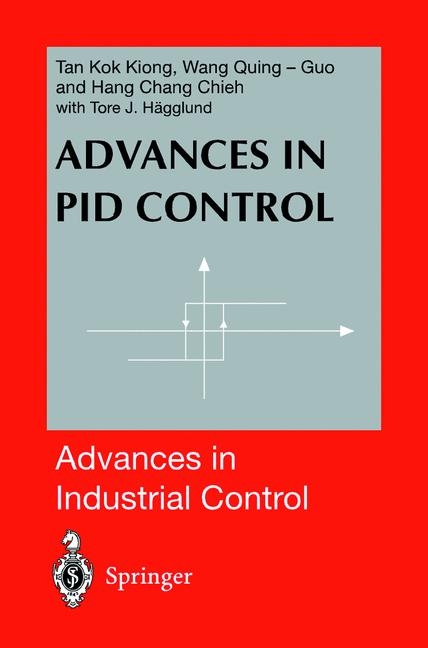
Advances in PID Control
Springer London Ltd (Verlag)
978-1-85233-138-2 (ISBN)
- Titel ist leider vergriffen;
keine Neuauflage - Artikel merken
Recently, a great deal of effort has been dedicated to capitalising on advances in mathematical control theory in conjunction with tried-and-tested classical control structures particularly with regard to the enhanced robustness and tighter control of modern PID controllers. Much of the research in this field and that of the operational autonomy of PID controllers has already been translated into useful new functions for industrial controllers. This book covers the important knowledge relating to the background, application, and design of, and advances in PID controllers in a unified and comprehensive treatment including:
Evolution and components of PID controllers
Classical and Modern PID controller design
Automatic Tuning
Multi-loop Control
Practical issues concerned with PID control
The book is intended to be useful to a wide spectrum of readers interested in PID control ranging from practising technicians and engineers to graduate and undergraduate students.
1. Introduction.- 1.1 Evolution of the PID Controller.- 1.2 Components of the PID Controller.- 1.2.1 The Proportional part.- 1.2.2 The Integral part.- 1.2.3 The Derivative part.- 1.3 Choice of Controller Type.- 1.3.1 On/Off controller.- 1.3.2 P controller.- 1.3.3 PD controller.- 1.3.4 PI controller.- 1.3.5 PID controller.- 1.4 Nomenclature of the PID Controller.- 1.5 Structures of the PID Controller.- 1.5.1 Parallel type.- 1.5.2 Series type.- 1.5.3 Relationship between Parallel and Series types.- 1.5.4 Incremental type.- 2. Classical Designs.- 2.1 Introduction.- 2.2 Design Objectives - Speed Versus Stability.- 2.3 Trial and Error Method.- 2.4 The Ziegler-Nichols Methods.- 2.4.1 The step response method.- 2.4.2 The frequency response method.- 2.4.3 The modified generalized frequency response method.- 2.5 The Stability Limit Method.- 2.6 The Cohen-Coon Method.- 2.7 The Tyreus-Luyben Method.- 3. Modern Designs.- 3.1 Introduction.- 3.2 Constraints of Classical PID Control.- 3.3 Pole Placement Design.- 3.3.1 PI control of first-order systems.- 3.3.2 PID control of second-order systems.- 3.3.3 General case.- 3.4 Dominant Pole Placement.- 3.5 Gain and Phase Margin Design I: PI Controller.- 3.5.1 The design method.- 3.5.2 Simulation study.- 3.6 Gain and Phase Margin Design II: PID Controller.- 3.6.1 Simulation study.- 3.7 Linear Quadratic Control Design.- 3.7.1 LQR solution for time-delay systems.- 3.7.2 PI tuning for first-order modeling.- 3.7.3 Simulation study.- 3.7.4 Extension to second-order modeling.- 3.7.5 Robustness analysis.- 3.8 Composite PI-Adaptive Control Design.- 3.8.1 Problem formulation.- 3.8.2 PI control based on first-order dominant model.- 3.8.3 Nonlinear adaptive control.- 3.8.4 Passivity of dynamical systems.- 3.8.5 Simulation study.- 4. Automatic Tuning.- 4.1 Introduction.- 4.1.1 Methods based on step response analysis.- 4.1.2 Methods based on frequency response analysis.- 4.2 Step Response Approach.- 4.2.1 Modeling from a step test.- 4.2.2 Simulation study.- 4.3 Relay Feedback Approach.- 4.3.1 Basic idea.- 4.3.2 Improved estimation accuracy.- 4.3.3 Estimation of a general point.- 4.3.4 Estimation of multiple points.- 4.4 On-line Relay Tuning.- 4.4.1 Configuration.- 4.4.2 Structure identification.- 4.4.3 Assessment of Control Performance.- 4.4.4 Controller design.- 4.5 FFT on Relay Transients.- 4.5.1 The FFT-Relay Method.- 4.5.2 Simulation study.- 4.6 Frequency Response - Transfer Function Conversion.- 4.6.1 Single and multiple lag processes.- 4.6.2 Second-order modeling.- 4.7 Continuous Self-Tuning of PID Control.- 4.7.1 Process estimation from load disturbance response.- 4.7.2 PID adaptation.- 5. Multi-loop Control.- 5.1 Introduction.- 5.2 The Modified Ziegler-Nichols Method.- 5.3 Review of the BLT (Biggest Log-Modulus Tuning).- 5.4 Modified Ziegler-Nichols Method for Multi-Loop Processes.- 5.5 Derivation of the Design Equations.- 5.6 Simulation study.- 5.7 Extension to Cross-coupled Controllers.- 6. Practical Issues.- 6.1 Introduction.- 6.2 Non-linearities.- 6.2.1 Transducer characteristics.- 6.2.2 Friction.- 6.2.3 Saturation.- 6.2.4 Hysteresis.- 6.2.5 Dead zone.- 6.2.6 Process characteristics.- 6.2.7 Gain scheduling.- 6.3 Disturbances.- 6.3.1 Set point changes.- 6.3.2 Low frequency drift.- 6.3.3 High frequency noise.- 6.4 Operational Aspects.- 6.4.1 Set point weighting.- 6.4.2 Auto-manual bumpless transfer.- 6.5 Digital PID Implementation.- 6.5.1 Selection of sampling interval.- 6.5.2 Discretization.- A. Industrial Controllers.- A.l ABB COMMANDER 351.- A.2 Elsag Bailey Protonic 500/550.- A.3 Foxboro 718PL/PR.- A.4 Honeywell UDC3300.- References.
| Erscheint lt. Verlag | 27.10.1999 |
|---|---|
| Reihe/Serie | Advances in Industrial Control |
| Co-Autor | Tore Hägglund |
| Zusatzinfo | XVII, 264 p. |
| Verlagsort | England |
| Sprache | englisch |
| Gewicht | 585 g |
| Themenwelt | Technik ► Elektrotechnik / Energietechnik |
| Technik ► Maschinenbau | |
| ISBN-10 | 1-85233-138-0 / 1852331380 |
| ISBN-13 | 978-1-85233-138-2 / 9781852331382 |
| Zustand | Neuware |
| Haben Sie eine Frage zum Produkt? |
aus dem Bereich


